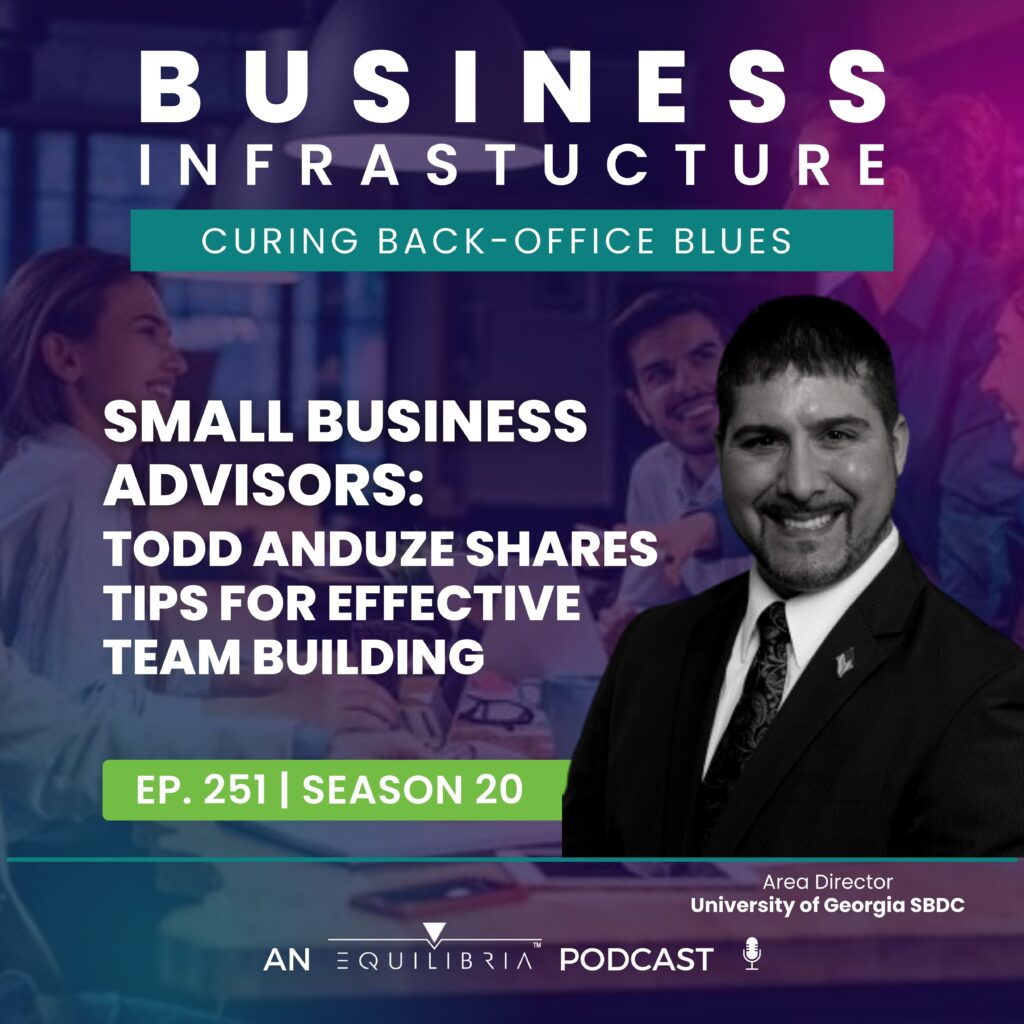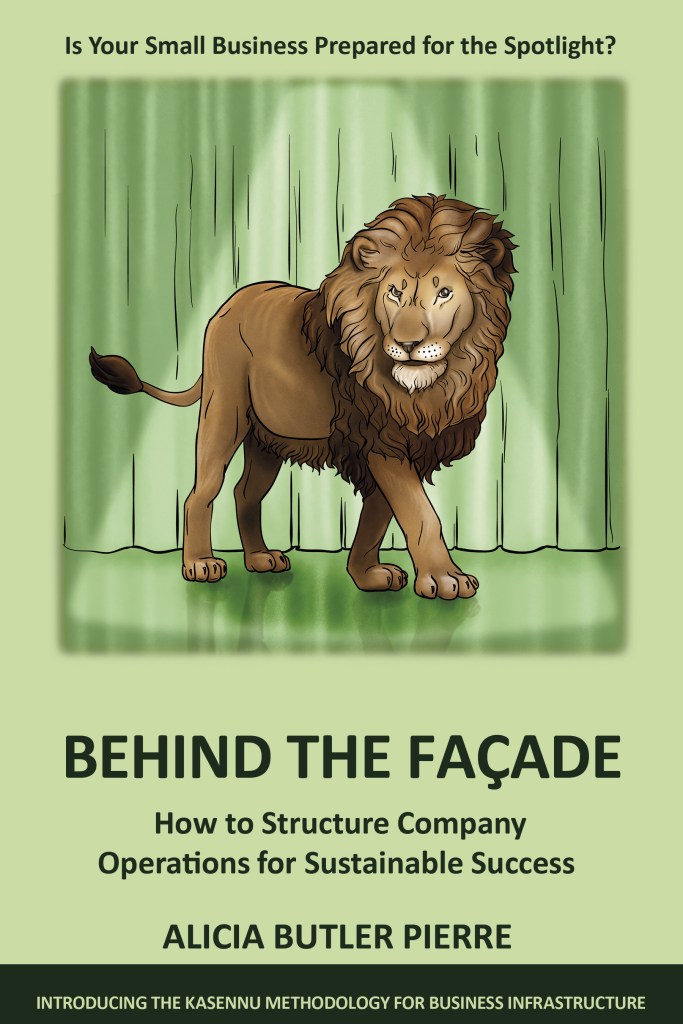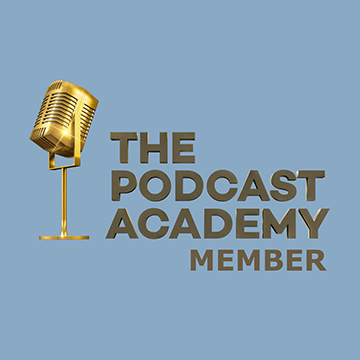Transcript
As your business grows, so does the need to add more people to your team. This isn’t a decision made lightly. Hiring people can be expensive, so it’s important to get it right the first time around. But what if you’re just not good at hiring? That’s what this episode is all about – team building.
This episode is underwritten by Equilibria, Inc. the company behind this podcast where we design scale-ready business infrastructure for fast-growing small businesses.

We’re in Season 20 of the Business Infrastructure podcast – the show where we share operational tips, strategies, and tactics to help you cure any back-office blues you might be experiencing. This season features 12 small business advisors, each with a unique skillset they’ll share with you.
Our next guest is a military veteran, former accountant, and psychologist who also worked in a mine. With such diverse experience, he’s seen it all when it comes to teams. The good, the bad, and everything in between. And he’s here today to impart his wisdom for us to consider as we expand our teams.
This is Episode 251 – Todd Anduze Shares Tips for Effective Team Building
My name is Todd Anduze. I work for the University of Georgia Small Business Development Center, at the University of West Georgia. I’m located in Carroll County, Georgia, but I do work for the University of Georgia. It’s a pleasure to be here.

As Todd just mentioned, he works for the Georgia SBDC. SBDC stands for Small Business Development Center. He’s an expert in accounting for small businesses but before we learn more about that, I first wanted to know more about him. He has a very interesting background starting with where he grew up.
My family’s from Puerto Rico. I was born in Miami. I moved to Georgia when I was in high school. Right out of high school. I went into the United States Navy during Desert Storm and I served as a plane captain, for the A6 intruder and F/A-18. After that, I moved to Boston. I got recruited down to Georgia from Boston, and I spent 12 years in the mining industry. During that whole time, I was earning my first degree. I did use the GI Bill to get my first degree, which is in management and accounting. And then I
went back and got my master’s degree in accounting.
Told you Todd had an interesting background. He’s certainly not your typical accountant. And what’s even more interesting is the fact that he’s back in school again, part-time, earning an advanced degree in psychology. Why would a military veteran with experience working in mining, accounting, and management decide to pursue a
degree in psychology?
So, we are really encouraged to pursue different aspects of the business. I’m a proponent of having a great team. When I was in the mining industry, they kind of gave me the entire process of hiring people. We had a huge turnover rate. We were hiring people that didn’t last, didn’t last too long.

And in the mining industry, it took $14,000 to train you before you could set foot in a mine. So, you had to go through the first aid, safety, the MHA training. And so, if somebody didn’t last but a week, that was just $14,000 that you threw out. So, they kind of gave it to me to start hiring people.
I extended that process. I started hiring some really good people, and I took that and I put it in the back of my mind as I’m developing my skills through the University of Georgia, that leadership aspect, that employee empowerment. We started doing some really, really big programs with Home Depot, with Walmart, and a couple of other ones that we were working with for their executive development, their leadership training, not management leadership.
And I started realizing that this is really understanding humans and this is really understanding personalities and understanding generations. And it’s psychology. So, I actually went back and I started taking a couple of classes before I went and got my degree in psychology. And then I’m working on my graduate-level psychology degree right now.
So that will be degree number four.
Yes.
Well, it certainly makes sense how Todd can use his knowledge of human behavior in providing advisory services to small business leaders through the Georgia SBDC. I wondered if that, combined with his U.S. Navy experience in building teams to accomplish a mission also had an impact on his consulting.
Absolutely. You know, I have the distinct opportunity to say that I have trained with both SEAL Team One and Seal Team Four. And that is the pinnacle of what a team, in my opinion, should be. Everybody knows exactly everybody’s duties. Everybody’s going in the same direction. When I got out, I worked in the mining industry and that was everything, a team should never be. I mean, it was completely disoriented, everybody doing their own thing.
In fact, I had people walk off the job. So I’ve got that range of what a team should never be and what a team should absolutely be, and I can kind of associate that. And that actually pushed me down that path of going, you know what? Everything revolves around that team.
Everything revolves around those types of understanding from the different members. And it’s all about hiring the right team and surrounding yourself with people that want you to be just successful. So, when you’re talking about a business, big, small, whatever you want to look at if you don’t have the right team in place and you don’t surround yourself with people that want you to be successful, then you’re gonna have a hard time. Now, I’m not saying that people can’t be successful by themselves or not having a team. It’s just a struggle, especially if you want to expand.
That’s an understatement. As entrepreneurs, none of us are an island unto ourselves. As the saying goes, there’s no “I” in “Team.” So how did Todd transition from the military to the mining industry onto accounting and ultimately as a Director and Small Business Advisor with the Georgia SBDC? Pay attention as he explains.
When I got out, I ran the plant. When I was in Boston, it was a little bit different cuz I went up there because my friend actually bought a service mine up there and needed my help. So that kind of got me into that industry.
When I was running the plant, I worked my way up to, assistant plant manager. And that whole time I was going to get my degrees. So I got my first degree, I kind of went a push for upper management, but that was during ‘07, ‘08 when the economy collapsed and construction was in the hole.
So, I actually jumped out of there, got a great severance package, was able to complete my master’s degree, was able to start working at a CPA firm, learning accounting, and really learning the language of business. That’s what I kind of thought that path was going to go, because I mean, being behind a desk after being in the mess for a long time. I love this job. I love being behind a desk.
And, it took me a while to get there. I think that my skills now, represented a little bit better in this position because when this director position opened up, it was definitely something I thought I could do. not saying that I couldn’t do the accounting, it’s just that people paid me to do their taxes, and paid me to do the bookkeeping. And they would come in and I’d be like, you know, if you do this, if your budget, if you lean up your company, you’re hemorrhaging money here. If you do that, you would be better, you’d be more profitable, or you could make a little bit more money in your pocket.

Some people loved it. Some people were like, “Hey, I just want to make the donuts.” And I’m like, “Okay, do that and I’m fine.” And I was very happy in that industry. I just knew that I could make a difference. I’ve always been in the service industry. I’ve always been just really wanting to assist people because when we think about it, this is just a job, and it shouldn’t really define you. What defines me more as assisting people, my family, and, making it easy.
In case you missed our interview with Shawn Palmer a few episodes ago, then you might be wondering, “What the heck is the Georgia SBDC?” So, I asked Todd if he wouldn’t mind explaining it.
Yeah, absolutely. We are one of 18 offices. I’m what’s called a host institution office. I have a satellite office at a different university. There are eight of us around the state. They’re in specific, institutions. So I report to the University of Georgia, but I also report to the University of West Georgia.
The SBDC is a little bit different in every state. It’s a little bit tweaked. So us being pretty much from the University of Georgia, public service and outreach, we are business consultants. Our job is to consult with businesses. Our job is to sit one-on-one with people and help them figure out their problems, and their pain points. We want to educate them in business. We don’t charge for our services. We’re 100% no charge. I’m not gonna sell you anything. I’m not gonna sell your information. Everything is confidential.
And we can bounce people around depending on their needs. So I always tell my clients that they’re dictating the actual conversation or the consultation. They can come in and go, “Hey, I wanna make a million dollars. Hey, I need marketing.” And then we’ll look at their business. We will look at how they’re operating. We’ll give ’em some recommendations, but we’re not going to go in and work and run their business. I’m not gonna be their bookkeeper. I’m not doing their taxes or any legal advice. I had a client ask me to fire somebody one day. And I said, “I really can’t do that.”

“I can recommend some changes.” And I will recommend some changes, but I’m also not a big proponent of firing people. In my opinion, if you fire somebody, that means that you hired somebody that shouldn’t have been hired. Now, there’s always gonna be somebody that’s gonna snow you. I’ve been snowed myself and somebody got through the interview process.
But if, if they’re sitting there saying they’re firing people, a lot of times I’m gonna go back and look at do they know what they want? Do they know what they don’t want? Do they have a great job description? Are they asking the right questions? Look, you’ve heard of good-fit employees. That is huge because if you’ve got a team and you’re adding someone to the team, then it shouldn’t be your decision.
In fact, Todd believes hiring new people should be a team effort. It can help you avoid common issues that can plague your business just as you start gaining momentum. Issues like ghosting and high turnover.
It should be everybody’s decision as a group. If you don’t know, what their drive is, or what they’re important to, then that’s a problem. If somebody’s working for just money and you know that, then you know that if somebody comes with a dollar more, they’re outta here. So, you need to know that. So understanding that, and before then, you hire the right people and you hire the people that are gonna be there to support your team.
Especially with small business owners, entrepreneurs, and themselves. They hire a lot of friends and family, which is not a bad thing, but if you don’t have a job description for Mom when she comes in, that’s gonna be a problem. If you don’t understand that your grandson wants to get off at three o’clock every Friday night to go hit the clubs and party, then you know, he’s gonna be calling in sick. He’s not gonna be dependable because you’re not giving them what they want. And, it’s not as simple as that.
But it is a good basis for understanding team building and having the right people on your side.
It’s clear how important Todd thinks team building is. It’s not enough to quickly fill vacant positions with the first people who express an interest in joining your company. Due diligence is vital to making sure someone is the right fit. This reminds me of the people element of business infrastructure. Business infrastructure creates a foundation for stability, growth, and scale by linking the people, processes, and tools required to
deliver your goods and services.
They’re all important. The people, the processes, the technology and tools, I mean, it’s all important. So if somebody was to come in and meet me for the first time, we’re going to kind of do like a 360 health check, kind of make sure all the actual processes are in place. Because you’re right, the tools need to be there, the process need to be there. And if we’re looking to build people, we look at that whole thing. We look at what they need, but really we look at the owners in what they need and if they’re even the
ones that are making the decisions.

Once you start getting into these bigger companies, we’re able to go up to 500 employees and $50 million in annual revenue as far as the size of a company. So, if we’re able to go that high, you’re talking about multiple, multiple employees. And one person can really mess up a team, man. One person can really hurt it. So, we like to look at everything.
And having this kind of holistic approach is what makes Todd so endearing. Coming up after the break, Todd will share two key things you should do to recruit the right people and build lasting team comradery.
How do you know if your business is growing faster than you can keep up with? If you have trouble keeping up with things like deliveries and projects. Your customers are angry, team turnover is high, and the complaints are piling up. Where can you go for relief? How can you save your business from the chaos of unmanageable, fast growth?
It might be time to build business infrastructure. Business infrastructure is a system for linking the people, processes, tools, and technologies that act as the heartbeat of your back-office operations. It gives your fast-growing small business a stable foundation to not only continue growing but to scale in a profitable, sustainable, and repeatable way.
That’s why if you want a business that can consistently operate without your daily presence, then the Smooth Operator course is for you. It’s an online introductory course on business infrastructure that can provide you with proven tools, tactics, and techniques to calm the chaos and restore order. Go to SmoothOperator.courses to learn more. That’s SmoothOperator.courses.
Welcome back. Before the break, Todd Anduze, the Director of the University of Georgia’s SBDC shared how his unique combination of experience in team building lends itself to helping fast-growing small businesses scale up with the right teams. Now he’ll take a deeper dive into exactly how he does that. Here’s Todd…
We like to look at job descriptions. We like to look at hiring practices, but we also like to look back and say, what hasn’t worked for you in the past? Who have you hired? I like to get people on a personal level. You definitely don’t want to go outside that box, but everybody does these standard questions. And, it’s really interesting, to see that if you ask ’em a question, they’re gonna tell you what you want to hear. If you ask somebody, “Hey, what’s your biggest weakness?” Which everybody asks.
They go, “Oh, I care too much, or I work too hard.” Or I, you know, come on now. I love when they do that cause I was like, “That’s great! I love that. Sounds more like a positive. Why don’t you think a little bit more and tell me what you really think your weakness is.” And you get ’em to think about it, and you get ’em to really look at scenario aspects and you don’t give ’em yes or no questions. After the first five-minute interview, I’m already thinking of what scenario I can talk to them about specifically from how they’re responding to some of these basic questions.
Because people are nervous in interviews. They want to tell you the best. So it prolonged that. Maybe they answered one question. Good. They don’t have to answer every question. Good. Let’s bring ’em back in and meet ’em and talk to ’em and maybe do a day in the life or take ’em to dinner. Because after a few interviews, they’re gonna let their guard down. They’re not gonna be answering things the way you want to hear.
They’re gonna be answering things cuz they’re comfortable, especially if they’ve already figured they’re past the nervous part. So you do that, but then you ask the easy questions. What drives you? What are your goals? And they’ll tell you some of the things. They’ll say that, “Oh, my goals are to be home every night for my family. I wanna be home with my kids.

And that’s the key! Only when people let their guards down do you really get to understand their motivations – those things that Todd described as what drives people you’re interviewing. This is golden information that you likely won’t get during the first interview. Todd provided more context by using himself as an example.
Now, I did say I was in Desert Storm, so that was a little while ago. I still have a 10-year-old and an eight-year-old daughter and son. So, this job was absolutely perfect because it allows me to come home every night. My job in the mining industry, they were paying very, very well. But I remember one night coming in or one day coming in and staying 22 hours in that place. That was when I was young and that’s when I could do it.
And I had different goals. I had a goal of buying a house. I had a goal of getting my degree. I didn’t have a wife, I didn’t have, kids. So that was what I was able to do. And now that I’ve transitioned into this, that is important to me. If you’re hiring somebody, you don’t know what their drive is, then you’ll be surprised when they go, “Hey, I gotta go. My kid’s in the hospital, or my kid’s got this, I’ve gotta go.” And if you go, “Nah, you can’t do that.” Guess what? They’re already thinking of another place to work.
Absolutely. So once people start to build their teams, they’re recruiting, interviewing, and ultimately making this job offers to people. From a team-building perspective, Todd, when do people usually bring you in to consult with them, specifically as it relates to team-building? Or, is it something that you kind of pick up on as you’re talking to some of your different small business clients?
Well, it depends. If I’ve had some people that specifically call me to come in and evaluate their processes. I do a lot of OSHA interpretations, inspections, and stuff. I’m actually the only one in the state that does it for our organization. So I travel around and I look at their process, I look at their safety program. I look at if they care about their employees. Are they empowering them? Are they giving them ways to be successful? Are they encouraging ’em to better themselves? A lot of this stuff is what we want businesses to give us. Why aren’t we giving that to our clients and our business?

So I’ll go in and, and we’ll talk about it and, and you said an onboarding aspect, it’s huge, but also it’s just like a business plan. You can have a process and procedures in place, but if you’re not evaluating that and using that on a continuous basis, then it, then it doesn’t mean anything. A business plan, if you put it together and you put it on a bookshelf and you never touch it, it doesn’t mean anything. I used to say, especially in, operations, “Hey, run it till it breaks. Figure out why it breaks, fix that break, and then run it till it breaks again.” And so you get to where you start seeing the bottlenecks in processes, procedures, tools, people, whatever, and you evaluate their team.
What Todd is describing is essentially taking an inventory of all of the elements of your business infrastructure – the people, the processes, and the tools – and analyzing each for things like effectiveness, efficiency, and productivity.
Everybody is on a list. Everything is on a list. Every machine is on a list, every process is on a list. Of course, small business entrepreneurs, they’re usually at the top of the list. and if I’m their consultant, I’m right under that. But, you’re evaluating the weakest link. And if it means you need to buy a new piece of equipment, guess what? You buy a new piece of equipment. If you need a new tool, you get a new tool. If you need to hire somebody else, then you don’t hire ’em for the bottom of the team. You
hire ’em for the middle of the team. You’re always continuously bringing in better people.
Now be warned, sometimes as you hire to continuously bring in better-qualified people, Todd says it might mean having to let go of a superstar or high performer.
Cause you don’t have the budget, or you don’t have the means. You don’t get rid of people that don’t matter. But I will tell you though, the hardest person I’ve ever had to let go was somebody that I worked with for about four years. I worked him into a good position. He was having some issues at first, but we didn’t just get rid of him. We found out that he was taking care of his grandkids and his grandkids had to go to school every day. So he was being late every day for a good reason. But I talked to him about it, and I didn’t just reprimand him and get rid of him.
I trained him on different machines. And at the end of the day, I actually had to let him go during the recession. And that hurt worse than anything. But I was honest with him. I said, “Look, you’ve been doing a great job. This has nothing to do with your performance. We just don’t have the budget for this position anymore. I have to let you go.”
It was a good conversation, and we talked about it, and I said, let me know how I can help you because I care and he’s part of my team. He wasn’t just somebody that had fired him and thrown him out the door. He was somebody that, when I got an opportunity, I got him another job at another place because it came up. But that’s kind of what we want, right? We want that understanding and we want that opportunity to develop. But he was a great hire. He was a great performer. He was just the weakest link at the time.
That’s an interesting story. And it highlights the role that communication and transparency play in effective team building. But, as Todd warns, use caution with both.
Transparency is a great word cuz it could be a double-edged sword. And that’s up to the individual. I have been known to not really have a filter. I’m going to tell you because I want you to know and I want them to not have a surprise. So, think about employee evaluations. If there are any surprises on that, then that’s the manager’s fault. And, I use manager and leader completely different because the manager is managing those processes, those people.
A leader is somebody that’s inspiring somebody. So, you can be a manager and a leader, but you can also be a manager and not a leader and a leader and not a manager. Cause I’ve seen people at the bottom rung of the chain of command be way better leaders than people that are up there. I knew this small business owner that, I mean, the worst thing he could do has come into the office. He disrupted everything. He was like a whirlwind. He comes in and, you know, mess everybody up in their processes. Take a three-hour lunch, and bring people down onto the safety floor. And everybody had to be real careful. I said, “Hey, man, stay in your office. You’re messing ’em up!”
Like that cartoon with the Tasmanian devil.

Yeah. Let’s find where you’re beneficial. Cause that ain’t it. You hired him to be a good manager. Let him do it. Let her do it. don’t mess ’em up because they want to impress you. They wanna work, do exactly what you wanna do, but you gotta be careful. So, yeah I love sitting people down and just kind of looking at that. But when I talk about a team that is not just employees, that’s, that’s people like you, that’s a team of professional consultants, vendors, CPAs, attorneys course. It’s developing people that want you
to be successful and we’ll evaluate that.
That’s an important point to make – especially if you consider yourself a solopreneur. Chances are, you aren’t really doing everything yourself. You likely do have a CPA that you outsource accounting work to or an attorney that you rely on to review your contracts. It goes back to the previous point, none of us is an island unto ourselves. And to reiterate just how important communication and transparency are in building and sustaining teams, Todd shared another example.
I do evaluate CPA firms a lot because I was part of that industry for a while. And I remember one of my favorite CPAs, I mean, he’s one of the smartest people that I’ve worked with. One of my clients, they were working out and, it was at a Gold’s Gym or something and the client was on a treadmill and my buddy’s CPA was on the treadmill, and they started talking, and blah, blah, blah. And of course, they started asking business questions and the client started asking them, well, then the next day, the
CPA actually billed him for the time.
Now, it seems crazy, right? But if he gave him legal advice or tax advice, then he is liable. So if he didn’t bill him, then he could open, open himself up for some liability. So, in my opinion, he didn’t do anything wrong. He should have had that transparency he should have said, “Hey, look, I can answer that question here. You can call me later and I can, but if I answer it, I’m legally liable to bill you. And I just want you to know.” So he didn’t disclose that. It was kind of done in the engagement letter, to begin with, but, you know, transparency, communication, is huge because there are two people that really didn’t communicate well, did they?
So, remember how Todd said that transparency and communication can be a double-edged sword? I had a question for him. Something that a friend and I had a debate about whether to share your company’s financials with your team. What does Todd think? Is that a good idea or not?
That’s a great question. You gotta remember what profit means. Profit is revenue minus all the costs. So you’re talking about depreciation, which doesn’t have anything to do with cash. So that profit itself doesn’t have anything to do with your bank account. So if they don’t understand that profit, at the end of the day, if you looked at my profit sheets when I was, doing taxes, my job was To get their tax liability as low as possible, right?

So their net income or their profit may not be what they think it is cuz you’ve got all these factors going in. So, do I think you should show that information? I don’t know if I would do that because they don’t understand it to begin with. And that’s what they’ll come back with, “Hey, we want our cut.”
Well, that’s not cut that’s at the end. And then if you’re talking about all these loans that you’ve got to pay off, that margin may be a lot lower than they think it is or that they even understand. That’d be like somebody saying, “Yeah, I wanna see your S corporation tax return.” Well, here you go. You don’t understand it. Anyways, there you go. So there’s no real reason to see it because you don’t understand it.
So I would say educating your employees if that’s something that is their need. If they need that and you’re not providing that, then it’s gonna create that communication this year. So you could say, “Hey look, I do want to show you some things or we can talk about that, but let’s break it down.” And then you can show ’em a part of it or a little smidge of it, or just the profit margin above the line or, or something like that, that doesn’t have all that other stuff in there and say, ”This does not necessarily mean cash.”
Hmm…so I guess that means it depends. But if you do share, proceed with caution. As we start to wrap up our time together, I wondered if Todd could share the best way to contact him and whether he consults entrepreneurs with businesses outside of Georgia.
I would go to www.georgiasbdc.org. It will show everybody that works for the SBDC in Georgia where you can get in touch with us. if you’d like to get in touch with me. I have no problem with my email. It’s [email protected]. We do a lot of webinars so that if you’re national, you can definitely look at, some of our webinars. We have a Start Smart, coming up that’s gonna be online. So it’s actually a pretty good program. We do charge for our signature programs. We do have a lot of training, but we don’t
wanna make money. We just wanna make sure we have our costs covered.

I’m glad Todd explained that. And before we officially ended our interview, he wanted to stress one more time the importance of well, you probably know by now, communication and transparency.
It doesn’t have to be dependent on how big your company is. It doesn’t have to be the owner, but if the first-line supervisor or the manager understands their team and understands their, employees and talks to ’em, then they know if they’re not happy and then they should take it upon themselves to say, “Well, is there something I can do?”
Now, there, as I said, there’s not always something you can do, but is there something I can do to engage this person to, you know, help empower them to keep them from being unhappy? And to tell you the truth, just caring says a lot. And it really says, “Okay, you know what? I had a bad day, but at least they’re not hammering me on top of my bad day.” You’ve heard this before, everybody’s dealing with something you have no idea they’re dealing with. You know, open that up and see what the problem is, especially with somebody that’s not happy.
And on that note, Todd, thank you so much. This has been fantastic!
You’re welcome. Thank you. It was my pleasure.
Let’s give it up for Todd Anduze! If you haven’t learned anything else today, it’s important of communicating and being transparent as you recruit, interview, and select people in the building and scale your team. Be sure to check out BusinessInfrastructure.TV to access links to the resources Todd shared during this episode, including the Start Smart program he mentioned. Again that’s BusinessInfrastructure.TV.

Thank you so much for listening! If you enjoyed this episode, then subscribe to the show and leave a five-star rating, and review wherever you’re listening.
Coming up in the next episode, you’ll hear from someone who is an entrepreneur but also works for a government agency who will offer tips and advice from both a small business owner’s perspective as well as an agency’s. Trust me, you don’t want to miss it!
As you continue navigating the operational challenges of managing a fast-growing small business, just remember to stay focused and be encouraged. This entrepreneurial journey is a marathon and not a sprint. So don’t grow alone! We’re here to support you so don’t hesitate to reach out to us.
This podcast was written, produced, and narrated by me, Alicia Butler Pierre. Audio editing by Olanrewaju Adeyemo. The original score and sound design by Sabor! Music Enterprises.
This is the Business Infrastructure – Curing Back-Office Blues podcast.






















